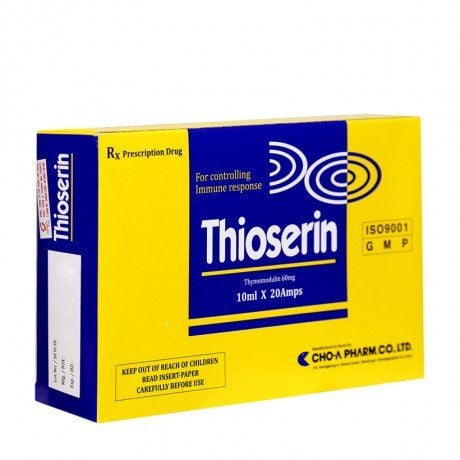This is an automatically translated article.
Cophacip drug is a drug to treat respiratory infections, ear, nose and throat infections, urinary tract infections, blood infections, meningitis,... So how to use Cophacip drugs? What precautions should be taken when using this drug? Let's find out the necessary information about Cophacip drug through the article below.
1. What is Cophacip 500mg?
Cophacip 500mg drug is a group of drugs that treat parasites, infections, antivirals, antifungals with the ingredient Ciprofloxacin. Drugs manufactured by Pharmaceutical Factory 150-Ministry of Defense circulated in Vietnam and registered with VDK VD-1188-06.
Pharmaceutical name: Cophacip 500mg
Classification: Drug
Registration number: VD-1188-06
Drug group: Antiparasitic, anti-infective, antiviral, antifungal medicine
Manufacturer: Pharmaceutical Enterprise Product 150-Ministry of Defense
Ingredients: Cophacip 500mg medicine contains the main ingredient is Ciprofloxacin, other active ingredients and excipients with just enough drug content provided by the manufacturer.
Dosage form: Film-coated long tablets
Packing: Box of 10 blisters x 10 film-coated tablets
Content: Need to carefully look at the drug form and content indicated on the product packaging or in the instruction sheet to Know the exact form of the drug and the content in the product.
2. Uses of Cophacip
2.1 What are the effects of Cophacip 500mg?
Antibacterial spectrum: Ciprofloxacin has strong activity, broad spectrum bactericidal. It blocks information from the chromosomes (genetic material) that are necessary for the bacteria's normal metabolism. This causes the bacteria to lose its ability to reproduce quickly. Because of this specific mechanism of action, ciprofloxacin is not subject to parallel resistance to other antibiotics not belonging to the gyrase inhibitor class. Therefore, Ciprofloxacin is highly effective against bacteria that are resistant to antibiotics such as aminoglycosides, penicillins, cephalosporins, tetracyclines and other antibiotics. While the combination of Ciprofloxacin with beta-lactam antibiotics and aminoglycosides mainly produces an additive and unchanged effect under in vitro conditions, under in-vivo conditions it usually produces an additive effect. effects (as in combination with azlocillin), especially in neutropenic animals. Ciprofloxacin can be combined with the following drugs: Pseudomonas: azlocillin, ceftazidime. Streptococci: mezlocillin, azlocillin and other potent beta-lactam antibiotics. Staphylococci: beta-lactam antibiotics, especially isoxazolylpenicillin, vancomycin. Anaerobic bacteria: metronidazole, clindamycin.
Effects and uses of Cophacip 500mg in other cases
Each type of pharmaceutical product has the main effect to treat some specific diseases or conditions. That's why only use Cophacip 500mg to treat the disease or condition specified in the instructions for use. Although Cophacip 500mg may have some other effects that are not listed on the approved label, you should only use this medicine to treat certain other conditions when directed by your doctor.
2.2 Indications Ciprofloxacin is indicated only for severe infections for which conventional antibiotics are ineffective to avoid the development of bacteria resistant to ciprofloxacin. Upper urinary tract infections Chronic prostatitis Skin, soft tissue, bone infections Severe nosocomial infections, sepsis, infections in immunocompromised patients Severe bacterial enteritis Prevention of encephalopathy Streptococcus pneumoniae Prevention of gram-negative infections in immunocompromised patients 2.3 Dosage and administration Dosage and administration of Cophacip
Usage:
Oral medication. Dosage:
Ciprofloxacin is indicated only for severe infections for which conventional antibiotics are not effective to avoid the development of bacteria resistant to ciprofloxacin. Urinary tract infections over 500 mg, twice a day. Chronic prostatitis 500mg, 2 times/day. Skin, soft tissue, bone infections 500 - 700 mg, 2 times/day. Severe nosocomial infections, sepsis, sepsis in immunocompromised individuals 500-750 mg, twice daily. Severe infectious enteritis : Treatment dose 500 mg x 2 times / day. Prophylactic dose 500mg/time/day. Prevention of meningococcal diseases: Adults and children > 20 kg: 500 mg / time / day. Children < 20kg: 250mg / time / day. Prevention of gram-negative infections in immunocompromised patients: 250-500 mg x 2 times/day. In the case of people with impaired renal function, if the dose is low, it is not necessary to reduce the dose; If high doses are used, the dose must be adjusted based on creatinine clearance, or serum creatinine concentration. Creatinine clearance (ml/min/1.73m2): 31 – 60 (serum creatinine: 120 – 170 micromol/liter): dose ≥750mg x 2 should be reduced to 500mg x 2. Creatinine clearance(ml/ min/1.73m2): ≤30 (serum creatinine : > 175 micromol/liter): dose ≥ 500mg x 2 nn reduced to 500mg x 1 2.4 Overdose, missed dose, urgent Overdose
In urgent cases or overdose with dangerous manifestations, call 911 or go to the nearest local health facility immediately. Relatives need to provide the doctor with the prescription they are taking, the medicines they are taking, including prescription and non-prescription drugs.
Missed dose
In case you miss a dose while taking your medicine, take it as soon as possible (usually it can be taken 1-2 hours before the time ordered by your doctor). However, if it is almost time for your next dose, skip the missed dose and take your next dose at the prescribed time. Be careful not to double the prescribed dose.
3. Note when using Cophacip
Contraindications
Subjects should not take Cophacip 500mg
People with a history of allergy to ciprofloxacin and related drugs such as nalidixic acid and other quinolones. Pregnant or lactating women, unless absolutely necessary. Note
Patients with severe renal failure, cerebral hemodynamic disorders. Elderly. Discontinuation when pain, inflammation, tendon rupture.
Note taking Cophacip 500mg during pregnancy
Avoid use during pregnancy; cause joint diseases in animal studies; Safer medications should be used, if available.
Notes on taking Cophacip 500mg drug during breastfeeding It is best not to or limit the use of the drug during breast-feeding. Many drugs have not yet fully determined the effects of the drug during this period, so mothers need to carefully read the instructions for use and consult with doctors and pharmacists before deciding to use the drug.
4. Side effects when using Cophacip
Occasional: loss of appetite, diarrhea, gastrointestinal disturbances, belching, vomiting, abdominal pain, abdominal distension, headache, dizziness, increased BUN, creatinine, increased liver enzymes.
Rarely: stomatitis, shock, photosensitivity, edema, erythema, acute renal failure, jaundice, hematologic changes, pseudomembranous colitis, arthralgia, myalgia.
Other side effects:
It should be noted that this is not a complete list of all side effects of Cophacip 500mg. During use may occur other side effects that have not been shown or have not been studied. If you have any other side effects of Cophacip 500mg that are not specified in the instructions for use, consult your doctor or pharmacist.
5. Drug interactions
When using two or more drugs at the same time, it is easy to have drug interactions leading to antagonism or synergism.
Drug interactions Cophacip 500mg with other drugs
Theophylline, NSAIDs, antacids, sucrafate, metal ions, cyclosporine.
Drug interactions Cophacip 500mg with food and drinks
When using the drug with foods or alcohol, beer, tobacco... because the foods and drinks contain other active ingredients, there should be other active ingredients. may affect the phenomenon of antagonism or synergism with the drug. Read the instructions for use carefully or consult your doctor or pharmacist about taking Cophacip 500mg with food, alcohol and tobacco.
Please dial HOTLINE for more information or register for an appointment HERE. Download MyVinmec app to make appointments faster and to manage your bookings easily.













